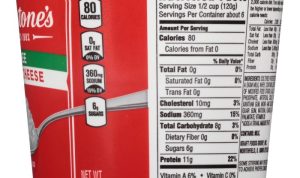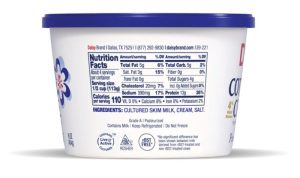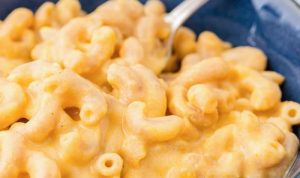Ingredients and Allergens
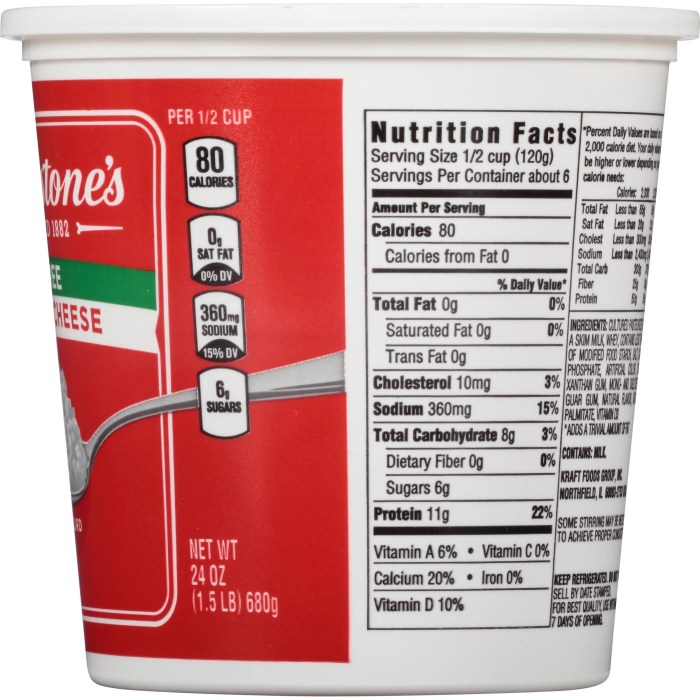
Kroger cottage cheese nutrition – Kroger cottage cheese, like many dairy products, has a relatively simple ingredient list, but variations can exist depending on the specific type (e.g., low-fat, whole milk) and production batch. Understanding these ingredients and potential allergens is crucial for consumers with dietary restrictions or allergies.
The manufacturing process significantly influences the final nutritional profile of the cottage cheese. Variations in ingredient sourcing can also impact the nutritional content, creating subtle differences between batches or even different Kroger locations.
Kroger cottage cheese offers a relatively low-calorie, high-protein option for breakfast or a snack, contrasting sharply with the higher calorie density of many other choices. Consider the nutritional impact of alternatives like a bacon egg cheese bagel nutrition profile, which often contains significantly more fat and sodium. Returning to Kroger cottage cheese, its versatility makes it a good base for healthy meals, providing a protein boost without the added baggage of a bagel breakfast.
Ingredient Composition and Allergens
While the precise ingredient list can vary slightly, Kroger cottage cheese generally contains pasteurized milk, cream, and cultures. These cultures are bacteria that ferment the milk, creating the characteristic texture and slightly tangy flavor of cottage cheese. Some varieties may also include salt, stabilizers, and enzymes. It’s essential to always check the label on the specific container purchased, as ingredient lists are subject to change.
- Pasteurized Milk: The primary ingredient, a source of protein, calcium, and other nutrients. A major allergen for individuals with milk allergies.
- Cream: Contributes to the richness and creaminess of the cottage cheese. Also a dairy product and a potential allergen.
- Cultures (e.g.,
-Lactococcus lactis*): Bacteria used in the fermentation process. Generally not considered an allergen. - Salt (Sodium Chloride): Added for flavor enhancement. Not typically considered a major allergen.
- Stabilizers (e.g., pectin, guar gum): May be included to improve texture and shelf life. Certain stabilizers may cause allergic reactions in susceptible individuals, though this is less common.
- Enzymes (e.g., rennet): May be used in the manufacturing process. Some enzymes, particularly those derived from animal sources, can be allergenic.
Manufacturing Process and Nutritional Impact, Kroger cottage cheese nutrition
The production of Kroger cottage cheese involves several key steps that influence its final nutritional composition. These steps include:
- Milk Pasteurization: High-heat treatment kills harmful bacteria, ensuring food safety. This process can slightly reduce some heat-sensitive nutrients.
- Culturing: The addition of bacterial cultures initiates fermentation. This process alters the lactose content, converting some of it into lactic acid, which contributes to the sour taste. The resulting changes in the carbohydrate profile impact the overall nutritional values.
- Coagulation: The milk proteins coagulate, forming curds and whey. This separation process impacts the protein and fat content of the final product. The whey, which is often removed, contains lactose and some nutrients.
- Draining and Processing: The whey is drained from the curds, and the curds are then processed and packaged. The amount of whey remaining impacts the moisture and fat content, affecting the final nutritional profile.
Ingredient Sourcing Variations and Nutritional Profile
The nutritional profile of Kroger cottage cheese can be subtly affected by variations in ingredient sourcing. For example, the milk used might come from different farms or regions, leading to slight differences in fat content, protein levels, and mineral composition. The type of cream used (e.g., heavy cream vs. light cream) also significantly influences the final fat content and calorie count.
Furthermore, the specific strains of bacterial cultures used in fermentation might also impact the final product’s taste and nutrient composition, although these differences are typically minor.
Health Benefits and Considerations: Kroger Cottage Cheese Nutrition
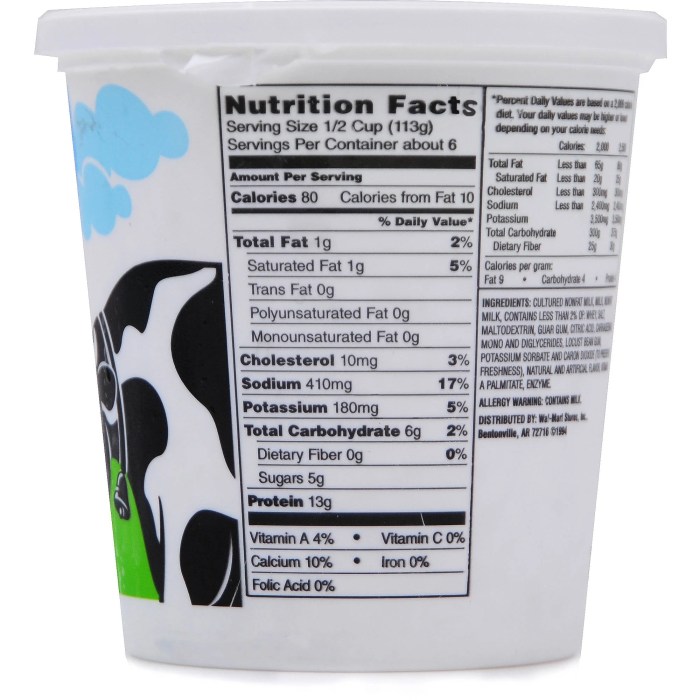
Cottage cheese offers a unique nutritional profile, making it a versatile addition to a balanced diet. Its high protein and calcium content contribute to several health benefits, while certain dietary considerations should be kept in mind for optimal consumption.Cottage cheese is a valuable source of high-quality protein, essential for building and repairing tissues, supporting muscle growth, and maintaining satiety.
A single serving can contribute significantly to daily protein needs, aiding in weight management and overall health. Furthermore, its richness in calcium is crucial for maintaining strong bones and teeth, reducing the risk of osteoporosis, particularly important for growing children and older adults. These benefits are enhanced by the presence of other essential nutrients, including vitamin B12 and riboflavin.
Potential Dietary Considerations
Individuals with lactose intolerance may experience digestive discomfort after consuming cottage cheese due to its lactose content. However, lactose-free varieties are readily available, allowing those with this sensitivity to enjoy the benefits of cottage cheese without the negative side effects. Additionally, some brands of cottage cheese may have a higher sodium content than others. Individuals monitoring their sodium intake, such as those with hypertension, should check the nutrition label carefully and choose low-sodium options.
Portion control is also crucial for managing overall calorie and fat intake.
Sample Meal Plan Incorporating Kroger Cottage Cheese
Incorporating Kroger cottage cheese into a balanced diet is straightforward. The following sample meal plan demonstrates its versatility and nutritional contributions.
| Meal | Ingredients | Nutritional Highlights |
|---|---|---|
| Breakfast | 1/2 cup Kroger Cottage Cheese, 1/4 cup berries, 1/4 cup granola | High in protein and calcium, provides antioxidants and fiber from berries. |
| Lunch | Salad with 1 cup Kroger Cottage Cheese, chopped vegetables, and a light vinaigrette dressing. | Provides a complete protein source, along with vitamins and minerals from vegetables. |
| Snack | 1/2 cup Kroger Cottage Cheese with a sprinkle of cinnamon. | A quick and easy protein-rich snack, low in sugar. |
| Dinner | Chicken breast with steamed vegetables and a side of 1/2 cup Kroger Cottage Cheese. | A balanced meal with lean protein, fiber-rich vegetables, and a calcium-rich side. |
Commonly Asked Questions
Is Kroger cottage cheese good for weight loss?
It can be! It’s relatively high in protein, which keeps you feeling fuller for longer. But calorie intake still matters, so watch your portion sizes, yeah?
Does Kroger cottage cheese contain gluten?
Generally, no. But always check the label just in case, as ingredients can change. It’s always best to be safe, innit?
Can I freeze Kroger cottage cheese?
Yeah, you can, but the texture might change a bit once it’s defrosted. It’s best used fresh, but freezing is a decent option if you need to preserve it.
What’s the difference between low-fat and full-fat Kroger cottage cheese?
Basically, the fat content. Full-fat will have more calories and fat, but also a creamier texture. Low-fat has less of both. It’s all down to personal preference, really.


